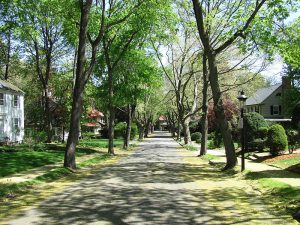
Dr. Michael Singer is a doctor and drone pilot in the wealthy Boston suburb of Newton. He is representing himself in a case challenging the drone ordinance that the city enacted last December, one of the most restrictive local ordinances passed to date.
According to the ordinance, “pilotless aircraft” are now subject to regulation under Newton’s “Civil Fines and Miscellaneous Offenses,” a long list of minor issues previously limited to things like smoking, snow removal and too-noisy leaf blowers. But the drone regulation is far from minor: among numerous other points that restate some of the FAA regulations, it requires that all operators register separately with the city for a $10 fee, and states that all flight over private property is prohibited at an altitude of under 400′ without the express permission of the owner. The latter provision effectively restricts any flight over private property, as FAA regulations do not allow for flight over 400′ without a waiver. In addition, flight is not allowed in public parks and spaces without a prior permit, filed by paper through the Parks and Recreation Department.
Under the ordinance, many commercial applications as well as recreational flight would be prohibited in Newton.
Singer has received guidance from drone pilots and regulations experts, who contributed to his argument. Singer claims that the regulation is in direct conflict with FAA preemption, which grants the FAA jurisdiction over navigable airspace; and that the ordinance violates his rights of transit and navigation under federal and state laws.
In a detailed document, Singer and his expert witnesses attempt to explain why the ordinance creates a problem – but the city’s response is frustratingly dense. Newton’s responses make it abundantly clear that the ordinance was passed without research into existing law. “The City lacks sufficient knowledge or information to admit or deny the allegations contained in paragraph… and therefore denies them and calls on Plaintiff to prove the same,” is intoned with monotonous frequency even over simple issues of abundantly documented Part 107 law. Newton’s lawyers deny that the city designed the ordinance with reference to a 400′ altitude limit in order to entirely limit flight over private property – which, if true, indicates a stunning ignorance of existing federal regulations.
The case has assumed significance to the drone industry after Senator Dianne Feinstein’s introduction of the Drone Federalism Act, which would give states sweeping powers to regulate drones. The case also serves to point out the danger of local laws to a growing industry: often formed with little or no research by individuals entirely unfamiliar with drone applications, drone regulations may have very significant unintended consequences for communities. The first of which may be expensive lawsuits.
Miriam McNabb is the Editor-in-Chief of DRONELIFE and CEO of JobForDrones, a professional drone services marketplace, and a fascinated observer of the emerging drone industry and the regulatory environment for drones. Miriam has penned over 3,000 articles focused on the commercial drone space and is an international speaker and recognized figure in the industry. Miriam has a degree from the University of Chicago and over 20 years of experience in high tech sales and marketing for new technologies.
For drone industry consulting or writing, Email Miriam.
TWITTER:@spaldingbarker
Subscribe to DroneLife here.